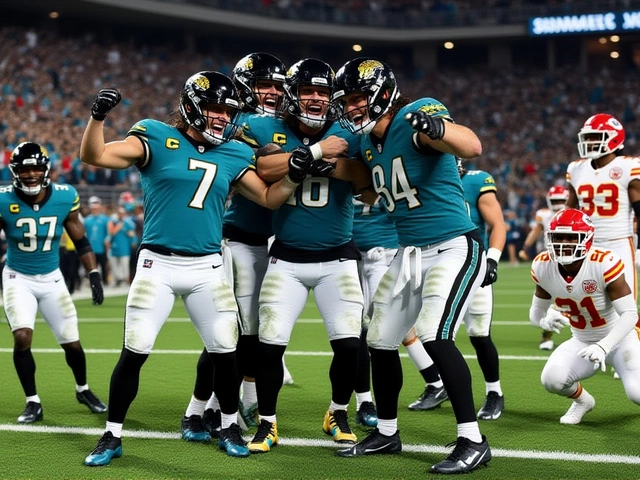On September 20, 2025, Swansea City U21 will take on Bristol City U21 in the first of three scheduled fixtures in the U21 Professional Development League—a competition that’s quietly shaping the next generation of English football talent. The match kicks off at 12:00 UTC at an as-yet-undisclosed venue, but what’s already clear is the stark contrast in form: Swansea City U21 sits comfortably in 7th place, while Bristol City U21 languishes in 16th. That’s a nine-place gap. And it’s not just about points—it’s about momentum, structure, and the kind of development that separates clubs investing in their youth from those still finding their footing.
Historical Edge, Current Struggles
Look back at the last seven meetings between these two youth sides, and you’ll find something surprising: Bristol City U21 has won just once. That single victory, recorded by SoccerPunter.com, stands out like a lone candle in a dark room. The rest? Dominance by Swansea. Yet here’s the twist—despite that historical advantage, Swansea City U21 hasn’t turned it into consistent league success. Their 7th-place finish isn’t a sign of dominance; it’s a sign of mediocrity in a league where top teams are already eyeing promotion to the elite tier. Meanwhile, Bristol City U21’s 16th-place standing suggests deeper structural issues: poor recruitment? Lack of coaching continuity? Or simply too many players stuck in transition between academy and first-team roles?
The November 4 Discrepancy
Here’s where things get odd. On Bristol City Football Club’s official match center, the November 4, 2025 fixture at Ashton Gate Stadium is listed as already played—with a final score of 1-1. But it’s not even October yet. This isn’t a typo. It’s a glitch. Or worse, a miscommunication between systems. The club’s website is supposed to be the most reliable source for fixture data. Yet here we have a future match marked as complete. No match reports. No lineups. No substitutions. Just a scoreline hanging in the digital void. Fans checking for updates are being misled. And for a club still rebuilding its identity after relegation from the Championship, this kind of administrative slip-up raises questions about the broader operational health of their youth setup.
Fixture Calendar and Venue Confusion
The three scheduled clashes—September 20, November 4, and January 13—are all documented across different platforms: Sofascore, AiScore, and the club’s own portals. But none agree on the venue for the first and third matches. Only the November 4 game has a confirmed location: Ashton Gate Stadium. That’s telling. Why is Swansea’s home ground—Swansea.com Stadium—not listed for any U21 fixture? Official sources say nothing about free admission policies for youth games there, and no announcements have been made. It’s possible these matches are being played at neutral venues to manage logistics, but the lack of transparency leaves fans in the dark. And when you’re trying to build a fanbase among the next generation, that’s a missed opportunity.
Senior Team Echoes
Don’t mistake these U21 clashes for irrelevant curtain-raisers. The senior Bristol City and Swansea City teams meet on November 22, 2025, also at Ashton Gate Stadium. Forebet’s predictive model suggests a tight game: 55% possession for Swansea, 15 shots to Bristol’s 14, and no yellow cards for the visitors. That’s a pattern. Swansea plays with control. Bristol fights with physicality. The U21 teams mirror that. And the players on the pitch this fall? They could be the ones stepping into those first-team roles next season. When Swansea City U21’s central midfielder, say, makes a 40-yard pass in the September match, it’s not just a youth game highlight—it’s a scouting report for the senior squad’s next transfer target.

What’s at Stake Beyond the Scoreline
The U21 Professional Development League isn’t just a training ground. It’s the final proving ground before players either earn a contract or get released. Clubs are required by The Football Association to meet strict player development benchmarks. But when a team like Bristol City U21 finishes 16th out of 20, it signals a failure in that system. Meanwhile, Swansea City U21’s 7th-place finish looks respectable—until you realize the top four teams are already in the promotion playoffs. They’re not building champions. They’re just avoiding the drop.
And here’s the quiet crisis: no one’s watching. Attendance figures aren’t published. Social media engagement for U21 matches is minimal. The media barely covers them. But the Premier League and EFL pour millions into these programs. Why? Because the future of English football doesn’t live in the stands—it lives in the training pitches of academies. If these youth teams can’t even get their fixture data right, how can they be trusted to develop world-class talent?
What’s Next?
The January 13, 2026 match at 13:00 UTC, as listed on AiScore, could be the turning point. If Bristol City U21 can finally break their losing streak against Swansea, it might signal a revival. If not, expect managerial changes, academy restructuring, and perhaps even a shift in their partnership with local youth clubs. For Swansea City U21, the challenge is different: how to turn consistency into dominance. They’ve got the structure. Now they need the spark.
One thing’s certain: these matches aren’t just about who scores. They’re about who’s preparing for tomorrow.
Frequently Asked Questions
Why is there a discrepancy in the November 4, 2025 match result on Bristol City’s website?
The 1-1 scoreline listed for the November 4, 2025 fixture on Bristol City’s official match center appears to be an error—possibly a system glitch or premature data upload. No match reports, lineups, or post-match analysis exist, and the date is still in the future as of mid-2024. Fans and analysts are advised to treat this as unverified until the club issues a correction. Similar errors have occurred in the past with other EFL clubs during system migrations.
How does the U21 Professional Development League differ from the Premier League 2?
The U21 Professional Development League is run by the English Football League (EFL) for Championship and League One clubs, while Premier League 2 is for Premier League academies. The EFL league has stricter age limits (mostly U21s with three overage players allowed), fewer teams, and less media coverage. It’s designed as a bridge between academy football and senior professional play, whereas PL2 often serves as a talent pipeline for elite clubs with deeper resources.
Why are Swansea U21 matches rarely played at their home stadium?
Swansea City U21 fixtures are often scheduled at neutral or away venues due to pitch availability, scheduling conflicts with the senior team, or logistical constraints. Unlike Premier League academies, EFL clubs rarely have dedicated youth stadiums. The lack of official announcements about free admission to Swansea.com Stadium suggests the club may not prioritize youth matchday experience—a potential missed opportunity for fan engagement and talent visibility.
What does Bristol City U21’s poor league position say about their youth development?
Finishing 16th out of 20 teams suggests significant challenges in player progression, coaching consistency, or recruitment. Bristol City’s first team has struggled since relegation from the Championship, and that instability often trickles down. The fact they’ve won only one of seven U21 meetings with Swansea—despite having a larger academy intake—points to a disconnect between investment and output. The club may need to overhaul its coaching staff or restructure its development pathway to compete.
Are any players from these U21 teams likely to break into the senior squads?
Potentially. Swansea’s U21 squad has shown more tactical discipline, with several midfielders and defenders receiving call-ups to the senior bench during injury crises in 2024. Bristol City has seen fewer promotions, but their lone U21 win over Swansea in 2024 came courtesy of a 19-year-old striker who later trained with the first team. Watch for young wingers and central defenders in these upcoming fixtures—they’re often the first to earn professional contracts.






